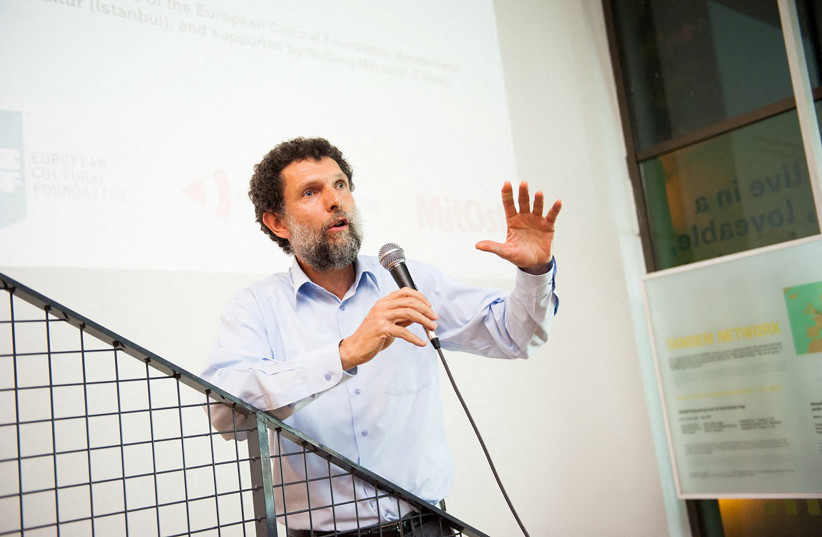The West’s response to Turkey’s human rights violations will be more muted due to its increased influence over the parties to the war in Ukraine, analysts told The Media Line, as hundreds protested Tuesday evening over the life sentence handed down for one of Turkey’s most high-profile political prisoners.
Protesters gathered near Istanbul’s Taksim Square a day after a Turkish court found Osman Kavala, a philanthropist and civil rights activist, guilty of attempting to overthrow the government by financially supporting anti-government protests.
Seven other civil rights activists each were sentenced to 18 years in prison for assisting Kavala.
The accusations centered around the 2013 anti-government Gezi Park protests, which Turkey’s President Recep Tayyip Erdogan has claimed were meant to overthrow the government, similar to the country’s 2016 failed coup attempt.
Kavala, 64, who has been held behind bars while awaiting trial for more than four years, has maintained his innocence. He is the founder of the nonprofit organization Anadolu Kültür, which promotes peace and dialogue through cultural and artistic projects.
Some of Turkey’s most important allies, including the United States and Germany, called for Kavala’s release after Monday’s verdict.
The European Court of Human Rights ruled in 2019 in a legally binding decision that Turkey should free Kavala, although he was kept imprisoned.
In 2020, a Turkish court acquitted Kavala of charges related to the 2013 protests, but he was immediately rearrested and the acquittal eventually was overturned.
Rights groups have accused the Turkish government of undermining the independence of the country’s judiciary.
Amnesty International said the trials were politically motivated and meant to silence critics. In a statement, the human rights organization called the verdict “a devastating blow not only to Osman Kavala, his co-defendants and their families but to everyone who believes in justice and human rights activism in Turkey and beyond.”
Human Rights Watch has said that Turkey is going through a “rule of law crisis.”
The Turkish government insists the country’s judiciary is independent.
The US is “deeply troubled and disappointed” by Kavala’s conviction, according to a statement issued by the US State Department.
"His unjust conviction is inconsistent with respect for human rights, fundamental freedoms, and the rule of law,” US State Department Spokesman Ned Price said in a statement.
“We remain gravely concerned by the continued judicial harassment of civil society, media, political and business leaders in Turkey, including through prolonged pretrial detention, overly broad claims of support for terrorism, and criminal insult cases,” he said.
Ryan Bohl, a Middle East and North Africa analyst with RANE/Stratfor intelligence platform, told The Media Line that it is notable that there have been no threats of downgrading relations or sanctions with Turkey by the US or other Western countries.
He believes that previous concerns the US had around human rights and the backsliding of democracy in Turkey are now seen as secondary issues in the wake of Russia’s invasion of Ukraine.
“Turkey's obvious value as a Black Sea power, as a NATO power means that a lot of these other [issues], especially the domestic issues that the US was critical of, are not nearly as big of a deal as they used to be,” he said.
While Turkey faces some of the greatest risks due to its reliance on Russia for energy and tourism, Ankara has become a key player in the war.
Turkey has maintained ties with both Ukraine and Russia, highlighted by Erdogan’s phone call on Tuesday with Russian President Vladimir Putin after speaking with Ukrainian President Volodymr Zelensky on Sunday.
Turkey also has applied a maritime convention that allows Turkey to partly block access to the Black Sea during wartime, limiting the movements of Russian ships.
There has been a slew of high-profile visits to Turkey since Russia’s invasion of Ukraine, including UN Secretary-General Antonio Guterres, who on Monday met with Erdogan ahead of meetings this week with the Ukrainian and Russian presidents.
The German Chancellor Olaf Scholz and NATO Secretary-General Jens Stoltenberg also have visited Turkey since Russia’s invasion of its neighbor.
Kristian Brakel, head of the Turkey office for the Heinrich Böll Foundation, told The Media Line that such visits highlight the significant role Ankara is playing in mediating the conflict.
Brakel said he is surprised by how critical some of the statements denouncing Kavala’s conviction were in light of Turkey’s increased importance as the war continues.
However, he stressed that the words have not been backed up by action and Turkey’s role in the crisis could be influencing the reaction of Western governments.
Brakel said the strength of this influence likely will be revealed by whether or not Ankara will face sanctions as a result of infringement procedures launched by the Council of Europe over Turkey’s continued detention of Kavala.
“If those will be very soft sanctions, which I assume they will [be], then I think it shows that member states are not willing to really put much force behind their words,” he concluded.

